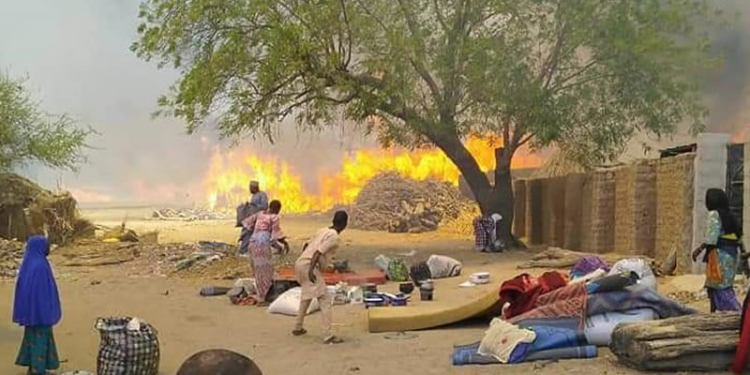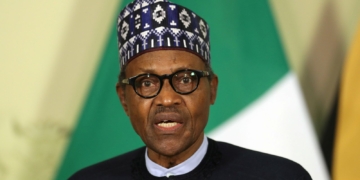International NGOs Monitoring Bureau, an organization that track the activities of Non-Governmental Organizations (NGOs), has indicted UNICEF, Mercy Corps and other international NGOs for embezzling donor funds earmarked for Internally Displaced Persons, IDPs.
The Bureau made this shocking revelations after undertaking a risk assessment of the participation of NGOs in humanitarian and relief efforts in the north east of Nigeria, which has been ravaged by the violent activities of Boko Haram, and lately they Islamic State West Africa Province (ISWAP), activities.
The group said during its assessment, it noticed some NGOs unethical fraternization and alignment with the terrorists in Nigeria, on whose behalf they apparently issued several statements or at the very least they issued statements that echo the position taken by the terrorists on critical national issues that have no direct bearing on relief work.
Mary Johnson, a Human Rights Lawyer who presented the report in London on Wednesday, warned the indicted NGOs to desist from acts that run contrary to the mandates of the funds.
The report below.
These NGOs are of interest because they operate on the same timeline as ongoing military action against the terrorists in the region. The realities on ground as a result has the NGOs threading the lines that cut across government troops, different factions of terrorists, local populations and other obscure players in the crisis.
Additional impetus for assessing the activities of these organizations arose from cases of conflicting stance on incidents that border on rights abuses, collusion with terrorists, facilitation of acts of terrorism amongst others.
The Bureau consequently content analyzed media reports covering a period of 24 months, statements issued by the NGOs in response to accusations and ones made to level accusations against he authorities, interviews granted by authorized spokespersons of the affected organizations amongst others.
The outcome of this exercise revealed that many of the NGOs are involved in the acts the government forces accused them of. A key piece of evidence in this regard is their unethical fraternization and alignment with the terrorists in Nigeria, on whose behalf they apparently issued several statements or at the very least they issued statements that echo the position taken by the terrorists on critical national issues that have no direct bearing on relief work.
This development has been linked to the financial inducement from the offshore, notably from entities that are opposed to Nigeria’s nationhood.
STUDY AREA
The risk assessment covered the motely 150 organizations operating in Nigeria’s northeast region where Boko Haram terrorists have been operating. The activities of the terrorists made it necessary for Nigeria to conduct military operations targeted at quashing the insurgency.
The Bureau identified: Amnesty International, Mercy Corps, Human Rights Watch, Action Against Hunger, UNICEF, and their local partners as organizations of interest given their run-ins with the military authorities and the allegations levelled against them.
Amnesty International, Mercy Corps, Human Rights Watch, Action Against Hunger, and UNICEF have received an estimated $20 billion in the period under review. The funds by all indications exceeded what the organizations expend on actual humanitarian work, which raises the question of what the funds are meant for.
Using the $20 billion fund, the identified NGOs were found to have engaged in actions that run contrary to their advertised objectives in the region as well as contravening terms upon which they were accredited to operate in the region.
UNICEF was found to have passed on classified military information to terrorists in a manner jeopardized anti-terrorism operations and imperiled troops that were sent to fight terrorists.
Action Against Hunger was found to have supplied food, medications and logistics to Boko Haram members in addition to helping terrorists register in camps for Internally Displaced Persons (IDPs).
Mercy Corps was found to have supplied food, medications and logistics to Boko Haram members in addition to helping terrorists register in camps for Internally Displaced Persons (IDPs).
Human Rights Watch engaged in production of pro-Boko Haram propaganda through the publication of reports that aimed to project government forces as being engaged in rights abuses.
Amnesty International ran and still runs intense pro-Boko Haram, pro-ISWAP propaganda against the military authorities and the government of the country.
The activities of these groups have at various times provoked responses from the military that involved suspension of operational accreditation, shutting down of offending operations and censure.
Other NGOs, mostly indigenous organizations, have responded to the activities of these above mentioned groups by holding protests to demand their expulsion from Nigeria.
The Bureau recommends that:
Home nations of the affected NGOs and supra-national organizations with implied oversight should all Amnesty International, Mercy Corps, Human Rights Watch, Action Against Hunger, and UNICEF to order and impress on them the need to respect Nigeria’s sovereignty.
Amnesty International, Mercy Corps, Human Rights Watch, Action Against Hunger and UNICEF should respect any cease and desist order, suspension or withdrawal of accreditation, enforced closure imposed by the military authorities in Nigeria without resorting to blackmail.
Financial Action Task Force should partner with Nigeria’s anti-graft agencies to further investigate the allegations of terrorism financing levelled against the various organizations with a view to unravelling the source countries for the funds that have been used for terrorism financing.
Legitimate donors to the identified groups should review their funding to ensure that they are not indirectly financing terrorism through support for the indicted organizations.
The authorities in Nigeria should review the criteria for accreditation of international NGOs working in the north east region of the country to include full disclosure of funding sources and disbursement, which would be made to anti-graft agencies with the capacity for tracking financial flow.
International NGOs Monitoring Bureau shall be conducting further assessments to verify the extent to which best practices have been embraced by the affected organizations and to identify if other organizations continue to operate above board or have fallen foul of applicable benchmarks.




Discussion about this post